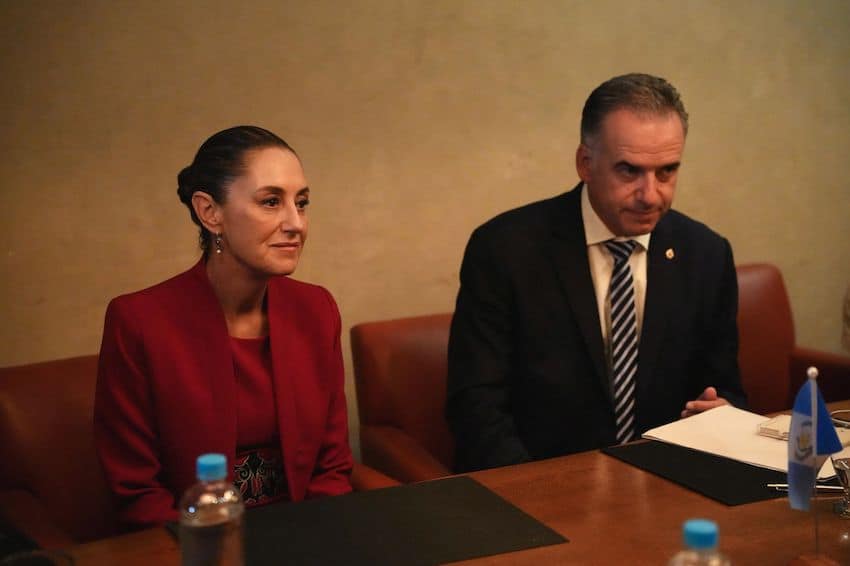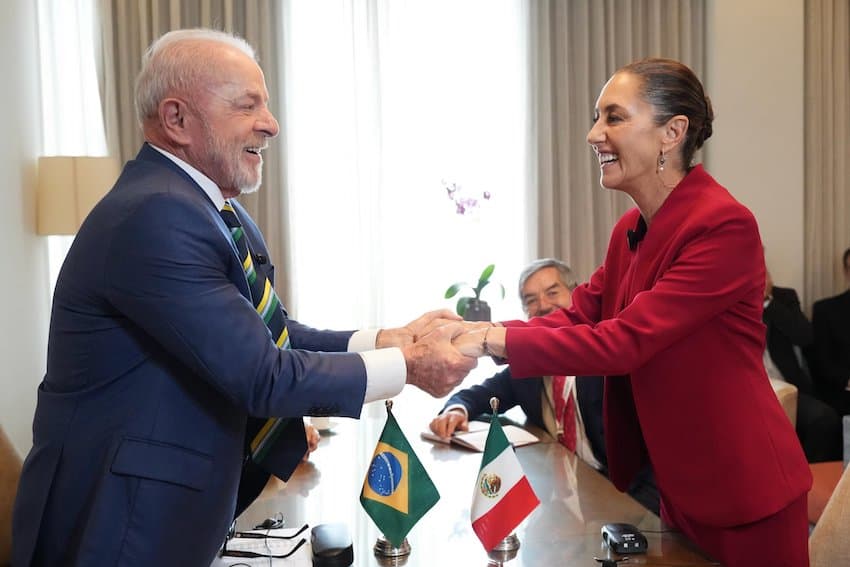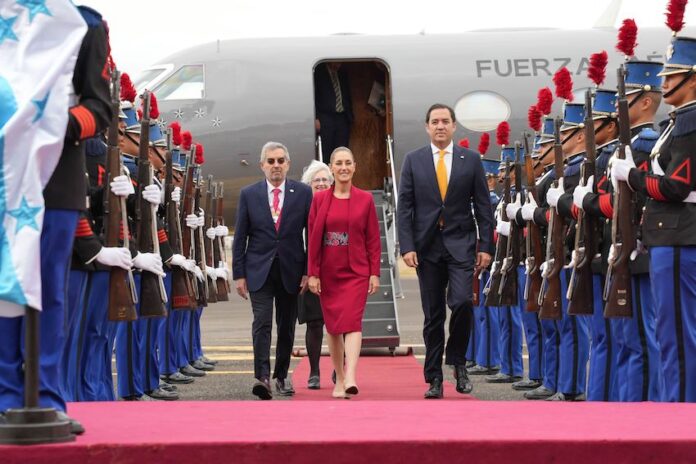President Claudia Sheinbaum on Wednesday called for “greater regional economic integration” during a speech at a gathering of Latin American and Caribbean leaders in Tegucigalpa, Honduras.
“Today I have a proposal for you,” Sheinbaum told presidents and prime ministers at the summit of the Community of Latin American and Caribbean States (CELAC) in the Honduran capital.
Saludamos a la presidenta de la República de Honduras y gran amiga de México, Xiomara Castro, en la IX Cumbre de la Comunidad de Estados Latinoamericanos y Caribeños (Celac). Agradezco la invitación en nombre de nuestro pueblo. pic.twitter.com/fm7whTMtcJ
— Claudia Sheinbaum Pardo (@Claudiashein) April 9, 2025
“I invite you, CELAC, to convene a ‘Summit for the Economic Wellbeing of Latin America and the Caribbean’ in order to make greater regional economic integration a reality,” she said.
Sheinbaum advocated enhanced economic integration between countries such as Mexico, Brazil, Chile, Guatemala, Honduras and Jamaica on the basis of “shared prosperity and respect for our sovereignties.”
Her speech at the summit of the 14-year-old bloc of 33 Western Hemisphere nations came at a time when the United States is increasingly seen as an unpredictable and unreliable trade partner.
U.S. President Donald Trump last week imposed sweeping and in some cases very high “reciprocal tariffs” on scores of nations, only to announce on Wednesday an immediate “90-day PAUSE, and a substantially lowered Reciprocal Tariff during this period, of 10%” for scores of countries while raising the U.S. duty on Chinese goods to 125%.
In her address, Sheinbaum told her Latin American and Caribbean counterparts that “profound changes in global trade” are taking place and affecting “our countries.”
“Each one of us is legitimately seeking the best for our people and nations,” she said.
“However, I believe that today, more than ever before, is a good time to recognize that Latin America and the Caribbean need unity and solidarity from the governments and their people in order to strengthen regional integration, always within the framework of mutual respect and observance of the sovereignty and independence of our countries and the trade agreements that each one us might have,” Sheinbaum said.
Mexico has free trade agreements with Chile and Colombia, and is part of the Pacific Alliance bloc with those two countries and Peru. However, there is no trade pact that covers all the CELAC nations.

Sheinbaum asserted that “a more united region is a stronger region that can articulate solutions and concrete proposals for regional integration and actions of cooperation in trade, education, science, technological development, clean energy and conservation of biodiversity with the vision of always building more egalitarian societies.”
“No country of Latin America and the Caribbean should be left behind, no boy or girl of Latin American and the Caribbean should be left behind, no man or woman of Latin America and the Caribbean should be left behind,” she added.
Our people are ‘still young,’ our land is ‘still fertile’
Sheinbaum highlighted that the combined and “still young” population of Latin America and the Caribbean “reaches 663 million people,” while the region’s GDP is “around US $6.6 trillion.”
“We are the world’s leading net exporter of food,” she added.
“Our land is still fertile. … We have more than 30% of the planet’s primary forests, 33% of its fresh water, almost 20% of global oil reserves, at least 25% of strategic mineral [reserves], and we’re capable of building development with justice and care for the environment,” Sheinbaum said.
“… The Latin American and Caribbean people are united by history, culture and the geography of a continent that extends over two hemispheres and between two oceans. Trade and economic exchange have united us for centuries,” she said.
“… The history of Latin America and the Caribbean, since the struggle for our independence, has been characterized by solidarity and mutual support. Today shouldn’t be the exception. These are times of greater will in order to promote the improvement and well-being of our peoples,” Sheinbaum said.
Sheinbaum and Lula hold bilateral talks at CELAC
Among the heads of state at the CELAC summit hosted by Honduran President Xiomara Castro in Tegucigalpa were Colombian President Gustavo Petro, who assumed the presidency of the regional bloc, Cuban President Miguel Díaz-Canel, Guatemalan President Bernado Arévalo and Brazilian President Luiz Inácio Lula da Silva.

Sheinbaum and Lula — the leaders of the two largest economies of Latin America — held a bilateral meeting on the sidelines of the summit.
“I met this morning with the president of Mexico @Claudiashein,” Lula wrote on social media.
“We spoke about the economic situation in Latin America and the Caribbean, and in the world. We decided to further strengthen relations between our two countries by promoting periodic meetings between our governments and the productive sectors of industry in Brazil and Mexico,” he said.
Two-way trade between Mexico and Brazil was worth more than US $16 billion in 2023, according to the Economy Ministry. Brazil sold more than $12 billion worth of goods to Mexico, while Mexico exports to South America’s largest country totaled just over $4 billion.
Last September, Brazilian and Mexican authorities advocated revising the current trade agreement between the two countries in order to strengthen bilateral ties.
A Mexico-Brazil trade pact signed in the early 2000s “sets the exemption or the reduction of imports fees for some 800 types of products,” Reuters reported.
Economy Minister Marcelo Ebrard said last September that “the growth of our relationship has already topped that agreement.”
“We need to update it,” he added.
Mexico News Daily
